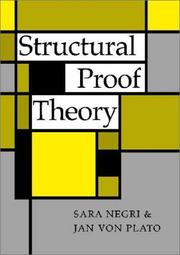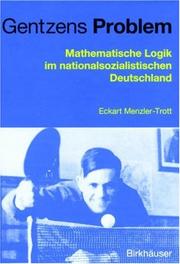| Listing 1 - 10 of 12 | << page >> |
Sort by
|
Book
ISBN: 9781107036598 9781107610774 9781139567862 110761077X 1107036593 1139567861 1139699008 1139862022 Year: 2013 Publisher: Cambridge: Cambridge university press,
Abstract | Keywords | Export | Availability | Bookmark
 Loading...
Loading...Choose an application
- Reference Manager
- EndNote
- RefWorks (Direct export to RefWorks)
Some of our earliest experiences of the conclusive force of an argument come from school mathematics: faced with a mathematical proof, we cannot deny the conclusion once the premises have been accepted. Behind such arguments lies a more general pattern of “demonstrative arguments” that is studied in the science of logic. Logical reasoning is applied at all levels, from everyday life to advanced sciences, and a remarkable level of complexity is achieved in everyday logical reasoning, even if the principles behind it remain intuitive. Jan von Plato provides an accessible but rigorous introduction to an important aspect of contemporary logic: its deductive machinery. He shows that when the forms of logical reasoning are analysed, it turns out that a limited set of first principles can represent any logical argument. His book will be valuable for students of logic, mathematics and computer science
Book
Year: 1980
Abstract | Keywords | Export | Availability | Bookmark
 Loading...
Loading...Choose an application
- Reference Manager
- EndNote
- RefWorks (Direct export to RefWorks)

ISBN: 0521793076 9780521793070 9780521068420 9780511527340 0521068428 0511527349 Year: 2008 Publisher: Cambridge: Cambridge university press,
Abstract | Keywords | Export | Availability | Bookmark
 Loading...
Loading...Choose an application
- Reference Manager
- EndNote
- RefWorks (Direct export to RefWorks)
Structural proof theory is a branch of logic that studies the general structure and properties of logical and mathematical proofs. This book is both a concise introduction to the central results and methods of structural proof theory, and a work of research that will be of interest to specialists. The book is designed to be used by students of philosophy, mathematics and computer science. The book contains a wealth of results on proof-theoretical systems, including extensions of such systems from logic to mathematics, and on the connection between the two main forms of structural proof theory - natural deduction and sequent calculus. The authors emphasize the computational content of logical results. A special feature of the volume is a computerized system for developing proofs interactively, downloadable from the web and regularly updated.
Proof theory. --- Arts and Humanities --- Philosophy --- Logic, Symbolic and mathematical --- Teoria de la prova

ISBN: 3764365749 9783764365745 Year: 2001 Publisher: Basel: Birkhäuser,
Abstract | Keywords | Export | Availability | Bookmark
 Loading...
Loading...Choose an application
- Reference Manager
- EndNote
- RefWorks (Direct export to RefWorks)
Mathematicians --- Logic, symbolic and mathematical. --- Gentzen, Gerhard.
Book
ISBN: 9780691174174 Year: 2017 Publisher: Princeton Oxford Princeton University Press
Abstract | Keywords | Export | Availability | Bookmark
 Loading...
Loading...Choose an application
- Reference Manager
- EndNote
- RefWorks (Direct export to RefWorks)
The information age owes its existence to a little-known but crucial development, the theoretical study of logic and the foundations of mathematics. The Great Formal Machinery Works draws on original sources and rare archival materials to trace the history of the theories of deduction and computation that laid the logical foundations for the digital revolution. Jan von Plato examines the contributions of figures such as Aristotle; the nineteenth-century German polymath Hermann Grassmann; George Boole, whose Boolean logic would prove essential to programming languages and computing; Ernst Schröder, best known for his work on algebraic logic; and Giuseppe Peano, cofounder of mathematical logic. Von Plato shows how the idea of a formal proof in mathematics emerged gradually in the second half of the nineteenth century, hand in hand with the notion of a formal process of computation. A turning point was reached by 1930, when Kurt Gödel conceived his celebrated incompleteness theorems. They were an enormous boost to the study of formal languages and computability, which were brought to perfection by the end of the 1930s with precise theories of formal languages and formal deduction and parallel theories of algorithmic computability. Von Plato describes how the first theoretical ideas of a computer soon emerged in the work of Alan Turing in 1936 and John von Neumann some years later.
Multi
ISBN: 9781400885039 9780691174174 Year: 2017 Publisher: Princeton Oxford Princeton University Press
Abstract | Keywords | Export | Availability | Bookmark
 Loading...
Loading...Choose an application
- Reference Manager
- EndNote
- RefWorks (Direct export to RefWorks)
The information age owes its existence to a little-known but crucial development, the theoretical study of logic and the foundations of mathematics. The Great Formal Machinery Works draws on original sources and rare archival materials to trace the history of the theories of deduction and computation that laid the logical foundations for the digital revolution. Jan von Plato examines the contributions of figures such as Aristotle; the nineteenth-century German polymath Hermann Grassmann; George Boole, whose Boolean logic would prove essential to programming languages and computing; Ernst Schröder, best known for his work on algebraic logic; and Giuseppe Peano, cofounder of mathematical logic. Von Plato shows how the idea of a formal proof in mathematics emerged gradually in the second half of the nineteenth century, hand in hand with the notion of a formal process of computation. A turning point was reached by 1930, when Kurt Gödel conceived his celebrated incompleteness theorems. They were an enormous boost to the study of formal languages and computability, which were brought to perfection by the end of the 1930s with precise theories of formal languages and formal deduction and parallel theories of algorithmic computability. Von Plato describes how the first theoretical ideas of a computer soon emerged in the work of Alan Turing in 1936 and John von Neumann some years later.
Book

ISBN: 1501502646 150150262X 9781501502620 9781501502644 9781501502620 1501502638 1501510800 9781501510809 Year: 2016 Publisher: Berlin Boston
Abstract | Keywords | Export | Availability | Bookmark
 Loading...
Loading...Choose an application
- Reference Manager
- EndNote
- RefWorks (Direct export to RefWorks)
A proof is a successful demonstration that a conclusion necessarily follows by logical reasoning from axioms which are considered evident for the given context and agreed upon by the community. It is this concept that sets mathematics apart from other disciplines and distinguishes it as the prototype of a deductive science. Proofs thus are utterly relevant for research, teaching and communication in mathematics and of particular interest for the philosophy of mathematics. In computer science, moreover, proofs have proved to be a rich source for already certified algorithms. This book provides the reader with a collection of articles covering relevant current research topics circled around the concept 'proof'. It tries to give due consideration to the depth and breadth of the subject by discussing its philosophical and methodological aspects, addressing foundational issues induced by Hilbert's Programme and the benefits of the arising formal notions of proof, without neglecting reasoning in natural language proofs and applications in computer science such as program extraction.
Proof theory. --- Mathematics. --- Logic, Symbolic and mathematical. --- Algebra of logic --- Logic, Universal --- Mathematical logic --- Symbolic and mathematical logic --- Symbolic logic --- Mathematics --- Algebra, Abstract --- Metamathematics --- Set theory --- Syllogism --- Math --- Science --- Logic, Symbolic and mathematical --- Mathematical Logic. --- Philosophy of Mathematics. --- Theoretical Computer Science.
Digital

ISBN: 9781501502620 9781501502644 9781501510809 Year: 2016 Publisher: Berlin ;; Boston De Gruyter
Abstract | Keywords | Export | Availability | Bookmark
 Loading...
Loading...Choose an application
- Reference Manager
- EndNote
- RefWorks (Direct export to RefWorks)
Book

ISBN: 9783110657883 Year: 2019 Publisher: Berlin Boston
Abstract | Keywords | Export | Availability | Bookmark
 Loading...
Loading...Choose an application
- Reference Manager
- EndNote
- RefWorks (Direct export to RefWorks)
Digital

ISBN: 9783110657883 9783110654547 9783110654301 Year: 2019 Publisher: Berlin ;; Boston De Gruyter
Abstract | Keywords | Export | Availability | Bookmark
 Loading...
Loading...Choose an application
- Reference Manager
- EndNote
- RefWorks (Direct export to RefWorks)
| Listing 1 - 10 of 12 | << page >> |
Sort by
|

 Search
Search Feedback
Feedback About UniCat
About UniCat  Help
Help News
News